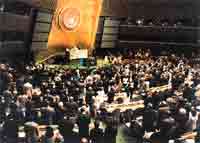
Economic goals set for scientists
Scientists in the West who have been flush with funds over the years are being shaken out of their smugness as taxpayers demand more tangible results from research efforts.

Scientists in the West who have been flush with funds over the years are being shaken out of their smugness as taxpayers demand more tangible results from research efforts.

<p><span style="font-size:14px;"><strong>Food safety in Pakistan</strong></span></p> <p><img alt="" src="http://www.indiaenvironmentportal.org.in/files/country/pakistan/foodsafety_hl.jpg" style="width: 530px; height: 300px; border-width: 2px; border-style: solid;" /></p> <p>Over the last few decades, the question of ensuring adequate food safety standards has evolved into a much more complicated problem with a series of interconnected factors to be considered. The evolution of science and technology such as the development of high precision analytical equipments and improved agricultural and preservation techniques have made it possible to obviate the manifold safety hazards.</p>

Is there a worldwide trend of sustained growth towards sustainable development?

Consumer consciousness has yet to make a dent in the mind of the average Indian buyer. That consumer is the king has remained merely a slogan of the consumer movement activists

Industry and people s rights organisations in India are at loggerheads over the shaping of the biodiversity bill and amendments to the existing patent act

The flush toilet system and the sewage system, which goes with modern day personal hygiene and cleanliness, are part of the environmental problem and not the solution. Consider the huge amount of clean water that is used to carry a small quantity of human

THIS IS not a time for capitalism to Icelebrate. The heady days of 1989 have given way to disenchantment with free markets in the Anglo-American world. The high tide of capitalism has touched the

Tax reforms, which would penalise the unlimited use of nature, are fast becoming an imperative part of preparing national budgets, prodded by the realisation that ecological costs have to be accounted for, here and now. But will Manmohan Singh pay heed to
THERE is more to health policy than just policy for the health sector. But the World Development Report 1993 clearly shows the mandarins -- read health experts -- of the World Bank have trivialised

Issues concerning the earth s future took a backseat as unseemly politics ruled the day at the just concluded Earth Summit II SUPRIYA AKERKAR reports from New York

Papua New Guinea has come a long way from a society that began cultivating crops in 8000 BC and had no need for a market economy. It came in touch with the outside world just about 100 years ago. Today, it exports minerals and imports food. The people com

WHAT CAN you do, as a citizen of India, if someone decides to set up a power plant or a polluting factory in your neighbourhood? Probably precious little. You could appeal to the local pollution
<p style="line-height: 22px; font-size: 14px; margin-top: 5px; color: rgb(0, 0, 0); font-family: Arial, Helvetica, sans-serif;"><em>Not raising diesel prices would harm economy much more'</em></p>
With ample sunlight almost around the year, one possibility is to use of solar energy to generate electricity in apartments and township projects in Chennai, writes Durganand Balsavar Steady strides: Solar Examples of how Solar Power is harnessed and used . House in Canada has solar panels on the roof. Impacted by the global context, Chennai is experiencing dramatic change with ever-increasing pressure from growing populations. Rapid urbanisation has resulted in considerable increase in the use of energy and fuel, consequently polluting atmosphere through the release of toxic emissions. This situation calls for a rapid and fundamental reorientation in our thinking, particularly on the part of planners and institutions involved in the process of urban development. The form of our future built environment must be based on a responsible approach to an ecological balance and the use of the inexhaustible energy potential of the sun. Buildings, in urban areas, are major consumers of energy. It has been estimated that in the US, residential and commercial buildings together use two-thirds of all electricity consumed in the country. While the situation is not as acute in India, increasing demands on urbanisation may push in that direction. The percentage of urban population in India increased from 18.0 in 1961 to 27.8 in 2001. The energy consumption raised threefold, from 4.16 to 12.8 quadrillion Btu between 1980 and 2001, putting India next only to the US, Germany, Japan and China in total energy consumption. There is greater recognition that it is time to take meaningful initiatives in this direction, through creating awareness of what are called 'green' buildings. Solar energy paradigm Solar lamp. With ample sunlight almost around the year, one possibility is through use of solar energy and other renewable energy sources to generate electricity to meet the needs of residential buildings in Chennai. At an urban scale similar initiatives could be undertaken to provide solar powered streetlights and other public facilities. Delhi government has decided to pass an order for compulsory use of solar power for advertising hoardings and water heating in government and some categories of buildings. The order also says that lights of advertisement hoardings shall be powered by solar photovoltaic systems at the cost of the franchisee and conventional streetlights shall be replaced by solar photovoltaic powered ones. Tsunami experiences In Tamil Nadu, renewable energy is now making a gradual impact especially in rural areas. Simultaneously though, its utilisation in urban and semi-urban areas has not yet been growing at the desired pace. Wind energy and solar energy seem to be the most preferred at this stage. Pertinent to mention here is that the Ministry of New and Renewable Energy (MNRE) has initiated a programme at the national level assisted by academic & research organisations, solar equipment manufacturers, and funding institutions like the Indian Renewable Energy Development Agency (IREDA). At the State level Non-Governmental Organisations have also, in the absence of infrastructure in rural regions, have invariably relied on solar energy sources. For instance, over the last three years, in coastal Tamil Nadu, affected by the tsunami, several rehabilitation and rebuilding programs were dependant on solar energy for their sustainability. Several temporary shelter enclaves were equipped with cost-effective solar lights and solar fans, in the absence of links to the TNEB network in remote inaccessible areas. The solar street lights are manufactured by companies such as Tata BP Solar. Though the initial cost of investment is relatively higher than the conventional systems, in the long term, in remote rural areas, solar energy has gradually come to be accepted as a more reliable alternative. Solar energy in Chennai Solar street light. If experiments to introduce solar energy are workable in housing settlements in Nagapatinam and Ladakh, a more systematic and concerted effort to explore the possibilities and constraints of introducing such systems in Chennai and other fast growing urban areas is required through the cooperative efforts of the various stakeholders. At a purely theoretical level, the unutilised surface area of the terraces of buildings in the city itself should provide enough incentive to gradually shift to renewable sources like solar energy. In addition balconies also become potential areas to harvest solar power. Even slopped roofs with tiles can accommodate solar panels. The present technology allows for less conspicuous solar array on the roof and they can harvest more energy with less space. In residential developments, the immense potential for use of solar energy equipment exists, through solar lights in common areas and open spaces, gateways, solar fans, solar water heaters and even the possibility of solar cookers in the kitchen. While it could dramatically reduce the consumption of electricity, savings in electricity bills could offset the initial investments. The fact remains that in harnessing it effectively, several initiatives are required.. A nominal solar power backup system UPS that can run 2 lights a fan and a TV can cost about Rs. 28,000/-. These systems have a 20-year durability and a battery life of 3 years. Apprehensions that a cloudy day could mean that there is no solar power need to be allayed.Several solar systems do have back-up energy systems to tide through a few days of cloudy weather. More user-friendly equipment could also facilitate its use on a larger scale. Concerns voiced by environmentalists on the excessive production of photovoltaic solar cells containing silica also need careful examination before deploying the technology. An integrated awareness of the benefits and constraints of solar energy and its sustainability over the long term in conserving and protecting our environment is essential. In order to attain these goals, it will be necessary to modify existing courses of instruction and training, as well as energy supply systems, funding and distribution models, standards, statutory regulations and laws in accordance with the new objectives. The author is an architect practising in Chennai and a visiting faculty at School of Architecture and Planning, Anna University.

The most powerful government in the world and the behemoth tobacco industry are waging a ding-dong battle over...well, cigarettes

Toxic pesticides used by developing countries wing their way up to the Arctic region, affecting the Northern climes, and find their way into the human system through water, and some life-forms dependent on it. The situation is so alarming that some enviro

Water will become the most prized and precious commodity in the coming years. Internecine conflicts over the resource are already the order of the day and a global water crisis seems not too far away. But the water-guzzling US state of California is show

Pushed out by salt